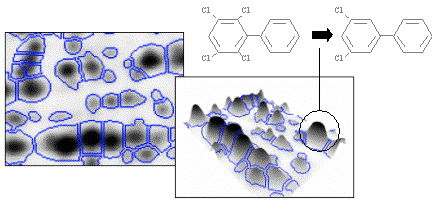|
|
Biology of Methanogenesis |
Department of Marine Biotechnology UMBC - Institute of Marine & Environmental Technology
Proteomics
and biochemistry of microbial dehalogenation

The
accumulation in the environment of anthropogenic chlorinated compounds such as
polychlorinated biphenyls (PCBs) and chlorinated benzenes (CBZs), and concern
for their potential impact to the health of humans, animals and entire
ecosystems, has created intense interest in the global chlorine cycle.
Anaerobic dechlorination of organochlorines is a critical step in the
biodegradation of these anthropogenic compounds in anaerobic sediments, but
the microorganisms responsible for many of these reactions have eluded
identification, isolation and characterization.
This has impeded our understanding of the biochemical mechanisms that
catalyze the reductive dechlorination of organochlorines.
Our
laboratory and collaborators have recently discovered a microorganism,
bacterium DF-1 that has the unique capability to dechlorinate several PCBs and
CBZs. This is the first microorganism shown to have the capability
to dechlorinate both of these disparate classes of compounds.
The objective
of this collaborative research is to exploit this recent discovery in
order to determine the physiological and novel genes/proteins for each of
these different dehalogenation pathways within one organism. The approach for achieving this objective includes: (i)
comparative physiological studies of bacterium DF-1 grown on the two classes
of organochlorines, (ii) identification of dehalogenating genes by monitoring
differential expression of proteins by 2D electrophoresis and tandem LC-MS,
(iii) functional confirmation and preliminary biochemical characterization of
dehalogenases. The immediate goal
is to discover the principals of dehalogenation by isolating and
characterizing the novel proteins and genes that catalyze these physiological
processes and to provide a foundation for the longer-term goal of deciphering
the complexity associated with the global chlorine cycle. This
research will expand our understanding of the
biodiversity and complexity, both organismal and metabolic, associated with
dehalorespiration that has evolved in response to the global cycling of
organic chlorine.
 Collaborator
Collaborator
Hal
D. May, Ph.D., Medical University of South Carolina
Project Team
Ethel Apolinario
Related Publications and Abstracts
Fagervold, S.K., J.E.M. Watts, H.D. May and K.R. Sowers. 2005. Sequential reductive dechlorination of meta-chlorinated PCB congeners in sediment microcosms by two different phylotypes of Chloroflexi. Appl. Environ. Microbiol. 71: 8085-8090.
Miller, G.S., C.E. Milliken, K.R. Sowers, and H.D. May. 2005. Reductive Dechlorination of Tetrachloroethene to trans-Dichloroethene and cis-Dichloroethene by PCB-Dechlorinating Bacterium DF-1. Environ. Sci. Technol. 39: 2631-2635.
Milliken,
C.E., G. P. Meier, J. E. M. Watts, K. R. Sowers, and H. D. May.
2004. Chlorophenol
production by anaerobic microorganisms: transformation of a biogenic
chlorinated hydroquinone metabolite. Appl. Environ. Microbiol. 70 (4): 2494-2496.
Wu, Q., G.P. Meier,
K.R. Sowers, and H.D. May. 2002.
Reductive dechlorination of polychlorinated benzenes by Bacterium DF-1,
a polychlorinated biphenyl-dechlorinating microorganism.
Environ. Sci. & Technol. In press.
Wu,
Q., Watts, J.E.M., K.R. Sowers and H.D. May.
2002. Identification of a
bacterium that Catalyzes double-flanked PCB dechlorination.
Appl. Environ. Microbiol. 69(2): 807-812.
Cutter,
L.A., J.E.M. Watts, R.R. Hebert, K.R. Sowers and H.D. May.
2001. Identification of a
Bacterium that links its growth to the reductively dechlorination of
2,3,5,6-chlorobiphenyl. Environ. Microbiol. 3(11): 699-709.
Funded by